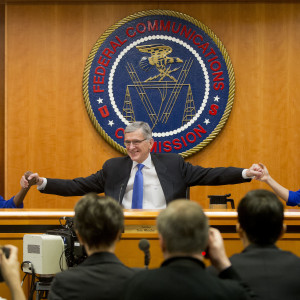House Republicans will take action on a bill to cap the Federal Communications Commission’s newly expanded Lifeline program in April, after a compromise between partisan commissioners fell through at the last minute Thursday.
The FCC’s March open meeting was pushed back several hours Thursday after Republican Commissioners Ajit Pai, Michael O’Rielly and Democratic Commissioner Mignon Clyburn spent Wednesday night hammering together a bipartisan proposal to update the Lifeline program.
Otherwise known as the “ObamaPhone” program, the update allows low-income Americans eligible to receive a $9.25 monthly subsidy for telephone service to apply it to fixed or mobile broadband Internet. The Democratic proposal dropped by Chairman Tom Wheeler‘s office in March raised the Lifeline budget from almost $1.6 billion to $2.25 billion in an effort to get more low-income Americans online.
Absent from the plan is a budget cap, traded instead for a budget mechanism to alert the FCC when Lifeline reaches 90 percent of its spending threshold. The alert would give commissioners six months to take action — opening the door to another expansion and more of the systemic fraud and abuse plaguing the program in recent years, according to Republicans.
That’s why Pai circulated a compromise plan to cap the budget at $1.75 billion along with other changes ahead of Thursday’s meeting — a cap he was willing to raise to $2 billion when Clyburn, a longtime advocate of modernization, offered to work with the frequently shunned Republicans on a compromise.
The compromise was still in place shortly before Thursday’s morning meeting, which was delayed well into the afternoon as Clyburn’s office received calls “from a wide range of individuals” urging her to support Wheeler’s original plan, Clyburn said.
“On further deliberation, I concluded such a mechanism does not fully achieve my vision of a 21st century Lifeline program,” Clyburn said on her decision to side with fellow Democrats in a 3-2 vote to pass the original proposal, plus a few changes including a minimum of 500 minutes for mobile voice plans and a five year phase-out of voice-only plans.
According to Republicans, the pressure on Clyburn to toe the party line also came from within the FCC itself.
“This agency in this proceeding represented the worst of government,” Pai said in his dissent, pointing the finger at Wheeler’s office. “Bipartisan agreements that would deliver digital opportunity to millions of Americans are thrown away and even Democratic commissioners are bulldozed simply because the chairman can get away with it.”
O’Rielly said he wouldn’t trust Clyburn’s office again, adding her last-minute abort “reminds me of an old phrase on Capitol Hill,” he continued. “Never count on a Dem to hold their vote.”
Democrats on the House Energy and Commerce Committee put additional pressure on the FCC Thursday in a letter rejecting “an artificial cap,” which they said would leave “many low-income consumers” without “any mechanism to bridge the digital divide.”
“Demand is expected to increase as the program transitions to include broadband service, and any cap would threaten the goals and purpose of Lifeline,” the letter read.
After Thursday’s meeting, a spokesman for Republicans on the same committee said they plan to move on a bill by Georgia Republican Rep. Austin Scott, introduced earlier this week to cap the budget at $1.5 billion.
“While the program’s original purpose had merit, the program in its current form is wrought with fraud and abuse, and its past time for Washington to respond to the calls of our constituents to rein this program in,” Scott said Monday. “American citizens, who are all too familiar with ‘ObamaPhones,’ understand this and can agree that it is simple good governance to ensure we are curbing wasteful spending while also promoting accountability across the federal government.”
Groups backing the plan including New America’s Open Technology Institute say it’s crucial to deploying broadband to more low-income Americans.
“The FCC’s decision to update its Lifeline program means that broadband may now be within reach for millions more broadband users,” OTI senior counsel and director Sarah Morris said Thursday. “For decades, the Lifeline program has provided critical support for phone service, and today’s order reflects the evolving communications needs of low-income households.”
Skeptics of the plan say a bigger budget doesn’t necessarily translate to more subscribers, and suggest more fraud is the likely result.
“The last time Lifeline expanded, to cover mobile services, it was beset by waste, fraud, and abuse,” TechFreedom policy counsel Tom Struble said after the meeting. “The program ballooned in size, forcing the contribution factor to spike. This lined the pockets of opportunistic middlemen but, as the GAO recently reported, produced no observable increase in adoption.”
Any legislation to cap the program would likely be dead on arrival at the White House.
In a separate item, the commission voted Thursday to advance a plan establishing new data privacy regulations over Internet service providers.

